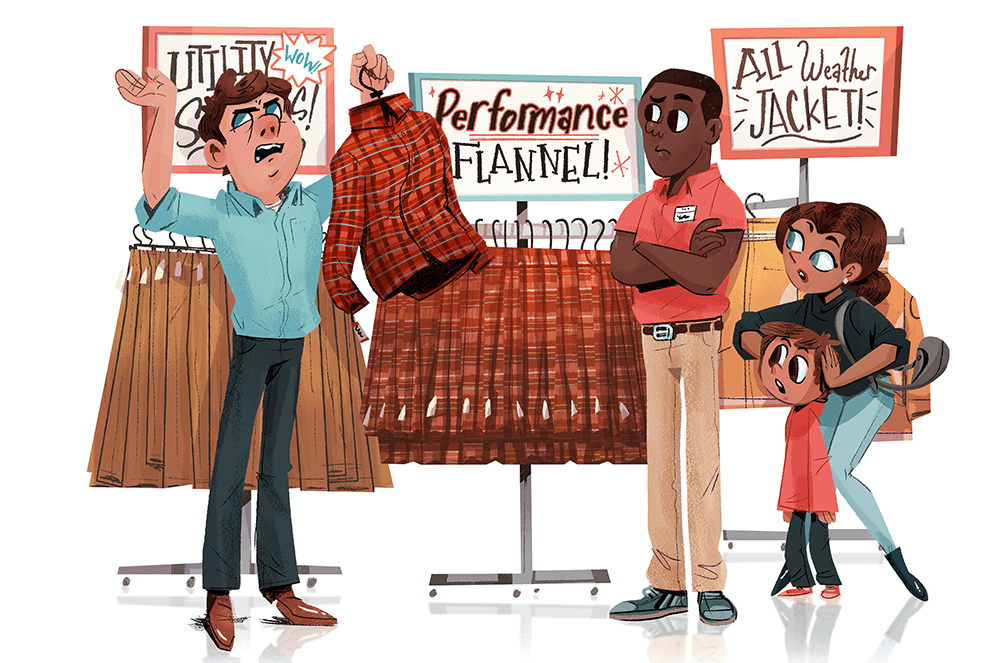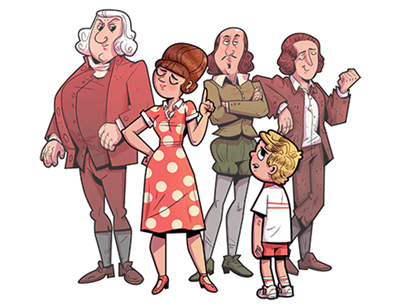 Illustration by Bart Browne
Illustration by Bart BrowneI was in a men’s clothing store recently when I happened upon a display of shirts marked “performance flannel.” I was sorely tempted to ask a salesperson, “What time does the performance start?” I didn’t, of course, and not just out of courtesy but because I spent 33 years as an advertising copywriter creating the same sort of catchy phrases. My friends joked that I lied for a living, which I did not. I simply dipped the truth in sugar. You must admit that “performance flannel” sounds better than just plain “flannel” and, while it doesn’t sing or dance or juggle flaming torches, it does, by keeping you warm, perform its duty as a flannel shirt. Close enough.
It is unfortunate, however, when someone tries to dip the truth in sugar and misses the bowl entirely. I saw an example of this on a billboard for a convenience store that read: IF YOU DON’T LOVE OUR COFFEE, IT’S FREE! This seems to assume that if their coffee tastes like crankcase oil, I’ll like it better if it’s free, because people like anything that’s free, right? In fact, I’ll be so be grateful for their generosity I won’t accuse them of trying to poison me. Or … what if I like their coffee but don’t really love it. Half price?
If “performance flannel” is legitimate, so too is “trained psychiatrist.” A trained psychiatrist sounds good, but if you’re untrained you’re not a psychiatrist, you’re my neighbor, who will be happy to diagnose what is wrong with you—not to mention the entire human race—free of charge. In the same category, we find the “factory-trained technician,” which I can only take to mean that a technician trained in a factory is somehow more qualified than one trained elsewhere … like a classroom, maybe?
And what of this pandemic? If anything calls for sugarcoating, it’s a worldwide plague that forces you to spend 24 hours a day with your children. To make it more palatable, we refer to these times as “challenging,” “uncertain,” “trying,” or “unprecedented”—words that conjure images of warriors fighting gallantly in a great struggle, even if it only means wrestling a senior citizen in the supermarket for the last roll of toilet paper.
Would you rather have a nice cholecystectomy or hear your doctor say, “Your gallbladder’s shot”?
For politicians, of course, sugarcoating is baked into the job description. It’s a legislator’s job to tell voters what they want to hear. If by some strange coincidence it happens to be true, that’s a bonus. On the other hand, a politician must always appear to be telling the truth lest she or he lose the trust of the people who don’t want to hear it. To accomplish this act of linguistic prestidigitation, a pol will frequently begin his or her remarks with “Make no mistake” or “Let me be clear.” This positions the speaker as a true statesman who is about to take a definite stand on some issue whether the audience likes it or not—which, of course, they do because 27 focus groups have said so. Another way of putting it might be: “This seemingly bold and risky position I’m taking is no mistake because my exhaustive demographic research makes it clear you’ll love it.”
As you might imagine, the medical profession faces special challenges here. Certain clinical diagnoses are best not stated bluntly lest the patient add panic disorder to his other maladies. Would you rather have a nice cholecystectomy or hear your doctor say, “Your gallbladder’s shot. I gotta open you up and pull it out”? On the other hand, there are certain occasions when a patient might like a little more information. Case in point: The results of my latest physical exam indicated tersely that it was “unremarkable.” Now, this is a good thing—my physician found nothing of concern—yet I somehow felt slighted. When a person my age gets a clean bill of health, it’s pretty remarkable, and I think “remarkably unremarkable” would have been a fine way to say it.
I myself don’t sugarcoat anything, especially when it comes to transgressions against my beloved English language. For example, when someone references a large number as “hundreds and hundreds,” it is incumbent upon me to reply, “That’s one hundreds too many. ‘Hundreds’ includes all the hundreds there are. If I bought a carton of eggs would I say I purchased eggs and eggs? Really?! Let’s think before we speak.”
Does that make me sound like an irascible old prig? Tell me. And don’t sugarcoat it.
John Cadley is a former advertising copywriter, freelance writer, and musician living in Fayetteville, New York. Learn more at www.cadleys.com.



 Previous
Previous
 Previous Article
Previous Article

